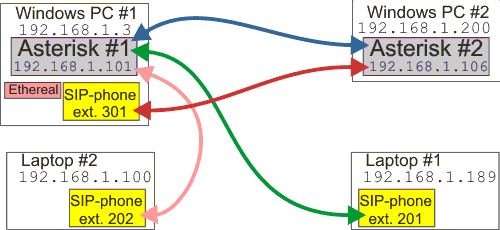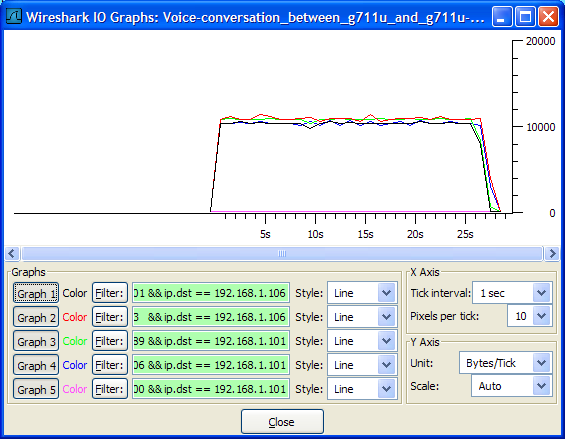Difference between revisions of "Voice only analysis"
From TD-er's Wiki
Jump to navigationJump to search| (11 intermediate revisions by the same user not shown) | |||
| Line 1: | Line 1: | ||
== Experimental Setup == | == Experimental Setup == | ||
| − | Because it is impossible to measure data traffic between two VM ware's | + | Because it is impossible to measure data traffic between two VM ware's on the same machine, the following setup is used. The SIP-phones all use the g711u codec. |
[[image:schematic_of_PC-config.png|Schematic overview of all PC's running which software.]] | [[image:schematic_of_PC-config.png|Schematic overview of all PC's running which software.]] | ||
| − | + | == Results == | |
| − | |||
| − | |||
| − | |||
| − | + | With WireShark data has been collected and the following filters are used in the in I/O-graph: | |
Filter-Black: ip.src == 192.168.1.101 && ip.dst == 192.168.1.106 | Filter-Black: ip.src == 192.168.1.101 && ip.dst == 192.168.1.106 | ||
Filter-Red : ip.src == 192.168.1.3 && ip.dst == 192.168.1.106 | Filter-Red : ip.src == 192.168.1.3 && ip.dst == 192.168.1.106 | ||
| Line 19: | Line 16: | ||
[[image:Wireshark-graph_G711_G711_traffic_Bps_oneway-traffic.png]] | [[image:Wireshark-graph_G711_G711_traffic_Bps_oneway-traffic.png]] | ||
| − | From the graph shown above there can be concluded that the IAX2 traffic (black and blue line) uses less bandwidth than the SIP-traffic (red and green line). | + | Legenda: |
| − | We also filtered for traffic between all three SIP-telephones and no traffic was detected. | + | * '''Blue''': Traffic between the Asterisk-boxes in the other direction. |
| + | * '''Black''': Traffic between the Asterisk-boxes in one direction. | ||
| + | * '''Red''': Traffic to and from SIP phone 301. | ||
| + | * '''Pink''': Traffic to and from SIP phone 202. | ||
| + | * '''Green''': Traffic to and from SIP phone 201. | ||
| + | |||
| + | == Conclusions == | ||
| + | |||
| + | * From the graph shown above there can be concluded that the IAX2 traffic (black and blue line) uses less bandwidth than the SIP-traffic (red and green line). This is due to the IAX trunking which reduced the overhead. | ||
| + | * We also filtered for traffic between all three SIP-telephones and ''no direct traffic was detected between them.'' | ||
| + | * The audio traffic is measured to be approximately 10500*8/1000=84kbps, which corresponds very well to the expected NEB value of 87.2 kbps. | ||
Latest revision as of 13:08, 23 February 2007
Experimental Setup
Because it is impossible to measure data traffic between two VM ware's on the same machine, the following setup is used. The SIP-phones all use the g711u codec.
Results
With WireShark data has been collected and the following filters are used in the in I/O-graph:
Filter-Black: ip.src == 192.168.1.101 && ip.dst == 192.168.1.106 Filter-Red : ip.src == 192.168.1.3 && ip.dst == 192.168.1.106 Filter-Green: ip.src == 192.168.1.189 && ip.dst == 192.168.1.101 Filter-Blue : ip.src == 192.168.1.106 && ip.dst == 192.168.1.101 Filter-Pink : ip.src == 192.168.1.100 && ip.dst == 192.168.1.101
Legenda:
- Blue: Traffic between the Asterisk-boxes in the other direction.
- Black: Traffic between the Asterisk-boxes in one direction.
- Red: Traffic to and from SIP phone 301.
- Pink: Traffic to and from SIP phone 202.
- Green: Traffic to and from SIP phone 201.
Conclusions
- From the graph shown above there can be concluded that the IAX2 traffic (black and blue line) uses less bandwidth than the SIP-traffic (red and green line). This is due to the IAX trunking which reduced the overhead.
- We also filtered for traffic between all three SIP-telephones and no direct traffic was detected between them.
- The audio traffic is measured to be approximately 10500*8/1000=84kbps, which corresponds very well to the expected NEB value of 87.2 kbps.

